An attempt to pull the shipwrecked Costa Concordia upright – one of the largest and most daunting salvage operations ever undertaken – is under way.
The operation was delayed for three hours because of an overnight storm, but began at 09:00 local time.
Righting the ship is expected to take up to 12 hours.
Engineers have never tried to lift such a huge ship so close to land. Thirty-two people died when it hit rocks.
The bodies of two of the dead, a passenger and a crew member, have never been recovered and may be found during the operation.
The Italian Civil Protection Authority said the sea and weather conditions had mostly been right for the attempt.
The storm overnight on Sunday delayed the positioning of a barge carrying a remote control room close to the shipwreck.
From that room, engineers will work using pulleys and counterweights to move the Concordia from the steep underwater incline it is resting on.
Sergio Girotto, an engineer working on the project, told reporters on Monday the operation was going ahead as planned: “Everything is going according to plan, we are following the plan to sequence… There is no problem whatsoever.”
He added that after the operation had been going for a couple of hours, “we should be able to see something with the naked eye”.

The incident happened off the Tuscan island of Giglio in January 2012.
The vessel has been lying on its side ever since.
Salvage workers are attaching giant metal chains and cables to the ship, which weighs more than 114,000 tonnes and is roughly the length of three football fields.
Five people have already been convicted of manslaughter over the disaster, and the ship’s captain, Francesco Schettino, is currently on trial accused of manslaughter and abandoning ship.
Officials say that they still need to make preparations for the salvage operation which they were planning to do on Sunday night before the storm.
The salvage operation had been due to begin at 06:00 on Monday.
“Due to heavy storms tonight, the operation has been put back by two hours,” to 08:00 civil protection chief Franco Gabrieli said.
Everything about the project is on a colossal scale.
More than 50 enormous chains and winches will be used to roll the ship – twice as heavy as the Titanic – up onto her keel.
By the end of Monday it should be sitting on a specially prepared underwater platform of steel and concrete.
Only after the ship is back up on her keel will it be possible to inspect it fully and begin to plan the next stage – the effort to repair and re-float it – and eventually tow it away to be destroyed.
The head of the operation, Nick Sloane, told AFP news agency that it was now or never for the Costa Concordia, because the hull was gradually weakening and might not survive another winter.
Engineers will try to roll the ship up using cables and the weight of water contained in huge metal boxes welded to the ship’s sides – a process called parbuckling.
This procedure must be done very slowly to prevent further damage to the hull, which has spent more than 18 months partially submerged in 50ft of water and fully exposed to the elements.
If the operation goes wrong, environmentalists warn that toxic substances could leak out into the sea. But booms and nets are in place to try to catch anything that emerges from the wreck.
For the people of Giglio, the salvage operation will be an important moment – and a special prayer was said during Sunday Mass.
Giglio mayor Sergio Ortelli said that the removal of the ship would bring an end to “a huge problem that we have in our port and that we want to solve as soon as we can”.
“Islanders can’t wait to see the back of it,” he said.
The small island’s economy depends hugely on tourism and the presence of the wreck has discouraged visitors.
Costa Concordia salvage project has so far cost more than 600 million euros ($800 million) and could cost a lot more by the time the operation is complete.
[youtube 2P-yhRaf_AA]
